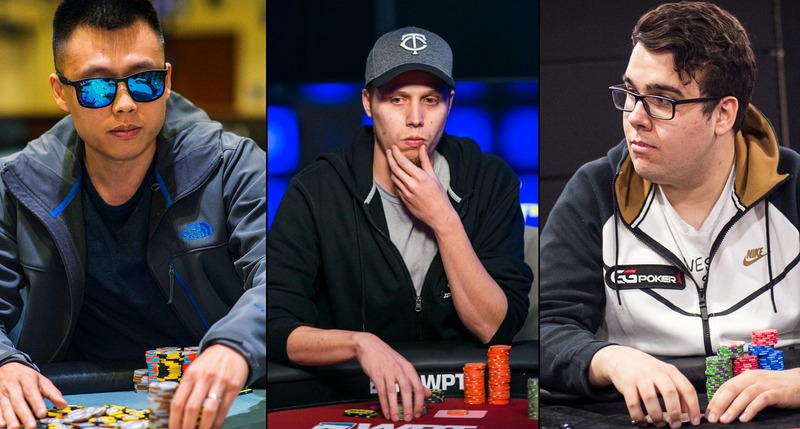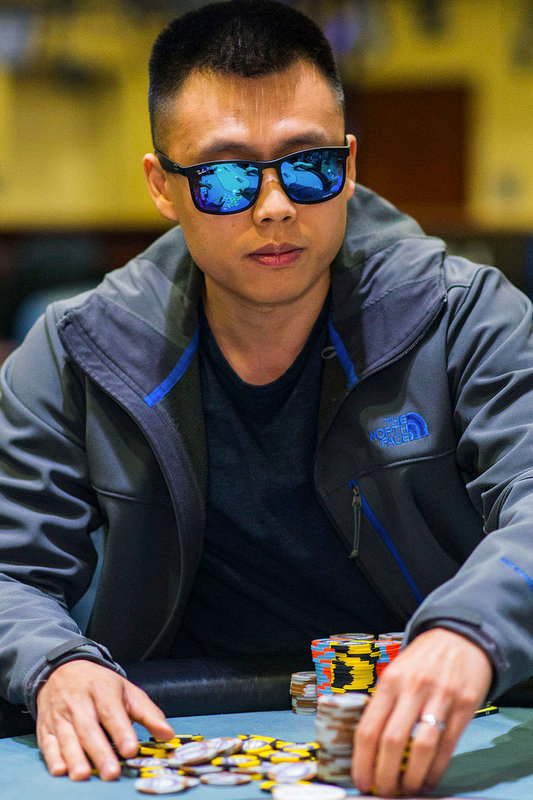






Head Games: Breaking Through In Poker With Ping Liu, Ian Steinman and Patrick TardifThree Poker Pros Explain What It Took For Them To Reach The Next Level Of Success In Poker |
|
|

As poker strategy becomes more advanced, it’s becoming tougher for players to move up through the ranks and become the best in the world. It doesn’t mean it doesn’t happen. It just means that it takes more work.
Over the last few years, Ping Liu went from a mid-stakes cash game grinder to leading the World Poker Tour Player of the Year race, Ian Steinman went from complete obscurity to winning WSOP.com’s Nevada Online Player of the Year in 2016 to a runner-up finish in a World Series of Poker bracelet event and two WSOP Circuit rings, and Patrick Tardif quietly rose up the online ranks and finished second in the PokerStars Sunday Million while streaming on Twitch last year.
Card Player caught up with all three to talk about what they did to take their game to the next level.
Steve Schult: All three of you had different defining moments in your poker career over the last few years. Were there any specific leaks that you plugged that really made a difference? Was there a specific ‘aha’ moment?
Ping Liu: I started off my professional poker career in 2012 in Chicago where I mainly played low and mid stakes cash games. I played local tournaments here and there and would go to Vegas for a few weeks every summer for the WSOP, but tournament poker wasn’t my main focus.
 About a year prior to WPT Rolling Thunder in March 2017, I had begun to transition my focus more towards live tournaments. I wouldn’t say there was a specific ‘aha moment,’ but I think just having the experience from playing more tournaments allowed me to make better tournament-specific adjustments to my game. That extra experience along with some run good at the right time led to my first major WPT final table.
About a year prior to WPT Rolling Thunder in March 2017, I had begun to transition my focus more towards live tournaments. I wouldn’t say there was a specific ‘aha moment,’ but I think just having the experience from playing more tournaments allowed me to make better tournament-specific adjustments to my game. That extra experience along with some run good at the right time led to my first major WPT final table.
Ian Steinman: I think the biggest change for me was moving to Nevada at the end of 2015, where I could play tournaments online every day. Playing a ton of volume online helped me get much better relatively quickly. I also watched one of my good friends who I have learned a lot from have success around that time, so I had some confidence in my game.
Patrick Tardif: Prior to me beginning my professional adventures and during my first few months as a pro, I was playing small- to mid-stakes Spin n’ Go’s on PokerStars. The countless heads-up and short-handed hands I played helped me develop my post-flop abilities and taught me how to develop and craft ranges. While I wasn’t finding much success in them, I was growing as a player.
I find a heads-up background can be incredibly valuable when pursuing any avenue in poker. The vast majority of hands you’ll play are heads-up. Once you fix and nail down preflop, you’ll be more equipped to handle situations and have a greater edge versus your opponents.
Steve Schult: What was your game like leading up to where you are today? Were you still a profitable player and did you feel like your game was missing something?
Ping Liu: I always had pretty good bankroll management and made sure I was winning in whatever game I was playing before I moved up in stakes. In terms of tournaments, I had some moderate success in the past with a few WSOP Circuit final tables as well as some final tables in the $1,000 and $1,500 bracelet events at the WSOP. So I was always a winning player, but never had any huge results.
I always felt like my short stack game was weaker than my deep stack game because I have much more experience playing in deep-stacked cash games. My short-stack game is still an area I am working to improve.
 Ian Steinman: I think I’ve been slightly profitable for a while in the smaller stakes, especially live. I played a lot of small-stakes live poker. I think I’ve always had a good feel for the people and playing so many hands of live poker in the last 10 years helps me a lot when I play live now.
Ian Steinman: I think I’ve been slightly profitable for a while in the smaller stakes, especially live. I played a lot of small-stakes live poker. I think I’ve always had a good feel for the people and playing so many hands of live poker in the last 10 years helps me a lot when I play live now.
Patrick Tardif: From 2010-2013, I was grinding micros and just wasn’t succeeding. Around November 2013, I decided to buckle down and actually get good. I sought out coaching and actively tried to improve. I was a very small winner until March 13, 2015. I deposited $50 on PokerStars and told myself for the 15th time that this was the last deposit. I got second in a $0.55 tournament for $78.40 and didn’t look back.
I think the biggest problem with poker is the unknown unknown. Not knowing what I didn’t know. I am very fortunate throughout the last five years to have found the friends and mentors I’ve had the pleasure of learning from. Having a core group of friends to bounce ideas off of who are not afraid to call you a moron or tell you a play is bad is crucial.
Steve Schult: How has your mindset changed since making the leap to another level of success?
Ping Liu: I would say that having my first breakthrough year on the WPT has given me more confidence in my game and decisions at the table. I always believed I could get to this level at some point, but putting up some results to back up that belief really does make a big difference. Now, I’m really looking for that first major title.
Ian Steinman: Overall, I have more confidence in my decisions and skill in general now than I did a year or two ago. But I question my decisions and try to find mistakes in my game as much as I can. It seems like the more you learn about the game, the more you realize you don’t understand. So there’s always something you do better.
Patrick Tardif: I don’t think my mindset has changed too much. I’m still heavily critical on every decision I make and am nowhere near satisfied with my game or where I’m at yet. I will say the confidence I’ve gained from the past two years as a professional helps stabilize me. I know what can happen if I can continue to work hard, stay focused and get a little lucky.
Steve Schult: How did you go about studying? What were you doing to analyze your game and plug leaks?
Ping Liu: I have always spent a lot of time watching training videos from CardRunners and Leggo Poker back in the day to Run It Once, RaiseYourEdge, and Upswing Poker present day. I also try to watch live streams whenever possible, as well as a lot of good free YouTube poker content. There is such a plethora of good material out there these days for anyone seriously trying to improve their game.
Ian Steinman: I used to read a lot and watch videos, but recently I’ve been working with coaches and trying to spend more time working on my game away from the table.
 Patrick Tardif: Throughout 2017 and 2018 it was a couple of things. Joining the ‘Team 651’ stable definitely shaped me into the player I am today. They had such a positive impact on not only my poker career but my life. I don’t think I’d be nearly as successful now as I am today. RaiseYourEdge’s tournament masterclass, fortunately, came out right around the time I began playing tournaments full-time.
Patrick Tardif: Throughout 2017 and 2018 it was a couple of things. Joining the ‘Team 651’ stable definitely shaped me into the player I am today. They had such a positive impact on not only my poker career but my life. I don’t think I’d be nearly as successful now as I am today. RaiseYourEdge’s tournament masterclass, fortunately, came out right around the time I began playing tournaments full-time.
I also got a fair amount of 1-on-1 coaching from Ryan Laplante. He helped me refine all the things I’ve been learning and potentially misusing. His guidance and mentorship has been critical to my success as well.
Steve Schult: How often are you reviewing your game now that you’ve made the jump?
Ping Liu: I still try to review my play as often as possible. Every time I play, I always try to write down a few key hands that I’m unsure about and then review them away from the table. I am constantly studying and trying to improve because this game is very competitive, especially at the high levels.
If you allow yourself to get complacent and don’t work on your game, you will quickly get left behind. Putting in the hours is important, but it’s really all the hard work and preparation away from the table that leads to results on the felt.
Ian Steinman: I feel more compelled to study now than before. I’m playing more big tournaments where making the right decision is really important. So, I think spending the time working on my game is extremely valuable.
Patrick Tardif: I’ll embarrassingly admit that It’s probably not enough. I think with streaming my play, there tends to be a lot more self-reflection on decisions made. Since my action are typically broadcast live, I’ll have to explain out loud what I’m doing. If there’s an error in my thought process or if something is too wild, I’ll often hear about it from the Twitch chat. So there is a little bit of regular review in my grind as is. I try to do some form of studying around 10 hours a week.
